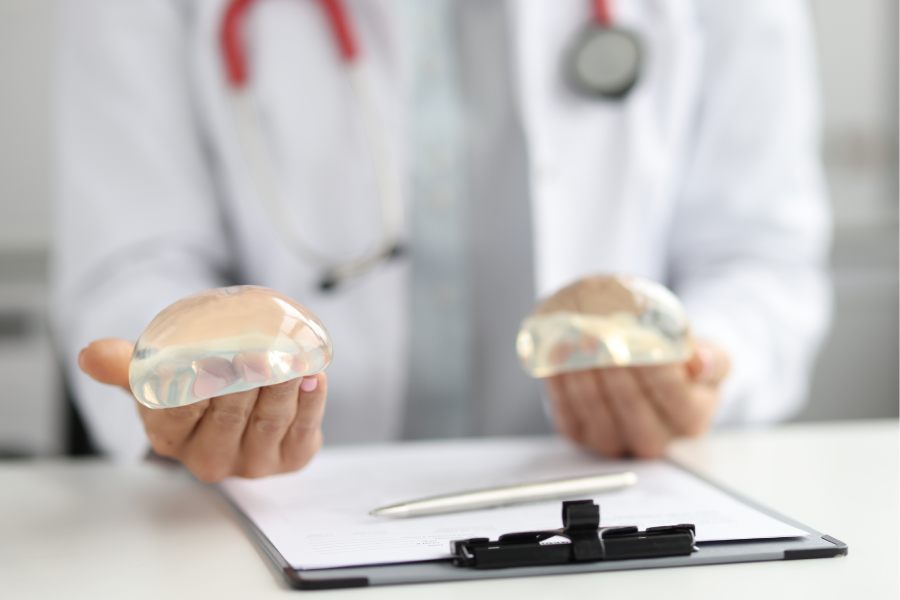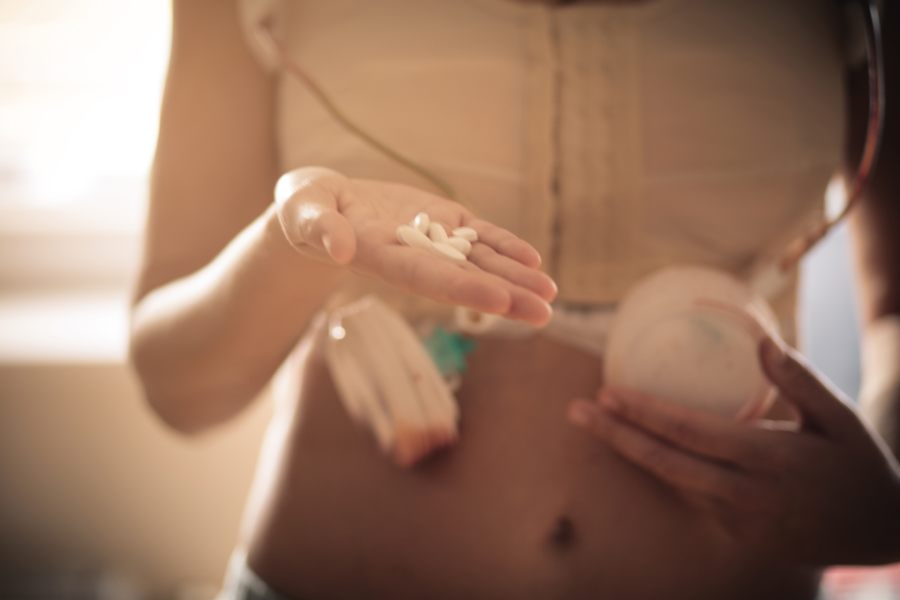Breast augmentation makes women feel better about their bodies. However, the procedure can sometimes have uncomfortable aspects to it, causing swelling and soreness. Millions of women try to learn how to relieve nerve pain after breast augmentation and heal quicker.
A significant portion of the women feel pain in the post-surgery period, and it can range from mild discomfort to more pronounced soreness. Sometimes the pain can manifest as sharp stabbing sensations, particularly during movement.
The reason why some women feel more pain compared to others is the difference in healing responses. Moreover, tolerance to pain can vary from person to person, giving different results.
[ez-toc]
How to Relieve Nerve Pain After Breast Augmentation
The significant occurrence of post-augmentation nerve pain has prompted the medical field to come up with ways to deal with this problem. Although short-termed, the nerve pain can be intense and cause discomfort, potentially impacting sleep and daily activities.
This increased demand isn’t because the methods and technology have failed but because there is an incredible demand for the procedure. More operations mean more occurrences of post-surgical nerve pain.
The issue can be addressed proactively through a combination of management strategies like pain medication, physical therapy, and exercise. These potential solutions can help reduce the pain and speed up the healing process for recovering patients.
There are various methods for relieving nerve pain following breast augmentation, like painkillers, nerve-blocking injections, and topicals.

Source: shutterstock.com / Photo Contributor: Roman Samborskyi
What causes nerve pain after breast surgery?
The most common cause of pain is the surgical trauma that comes as a result of the procedure. Breast augmentation requires incisions and tissue manipulation, which might lead to nerve irritation and injury. Although unpleasant, feeling pain can be considered a good sign that indicates the regeneration of the nerves.
After the operation, the skin becomes stretched to accommodate the implants, which may cause tightness until it adjusts to the increased volume. Another reason can be the position of the implants, as different positions can cause different types of pain.
From the moment you enter our office to the moment you leave with a successful breast augmentation, we will strive to cater to your needs, and you will receive what you came for. With the right guidance and expertise, the procedure may be a relatively straightforward one, as patients can effectively manage issues that might appear along the way. Contact us today and schedule a consultation!
Incision
During cosmetic breast surgery, an incision is a cut that allows access to the underlying breast tissue. This is for the purpose of creating a pocket for the implant that will later be placed.
Incisions can be made in the following positions:
- Around the areola
- Underneath the breast
- In the armpit area
These cuts can cause direct damage to the nerves, causing various levels of pain depending on the damage. The scar tissue formed from the incision may also contribute to pain as it puts pressure on the surrounding nerves.
Implant placement
The placement of the implant can be under the chest muscle or just beneath the breast tissue. This can impact the type and level of pain that can occur after the breast augmentation operation.
Submuscular placement can cause pain by stretching tissues and structures in the surrounding area of the breast. Most commonly, stretching the pectoralis major muscle can cause discomfort in the nerves that run between the ribs.
When placed beneath the breast tissue, the implant interacts with the surrounding nerves, and it could potentially cause pain or discomfort.
Placing the implant under the chest muscle is more painful, but some people prefer that method because it provides a more natural look.

Source: shutterstock.com/ Photo Contributor: megaflopp
Techniques to reduce nerve discomfort post breast surgery
There are several techniques you can implement that have been proven effective in alleviating nerve pain. People who refuse to take medication for whatever reason may only use these methods for tackling pain.
It’s vital that you consult with your doctor about choosing the optimal way to deal with post-breast augmentation pain.
These are some of the most recommended ones.
Physical therapy
In the postoperative period, patients may feel pain and limited mobility. A well-targeted physical therapy might contribute to a faster recovery and reduced nerve pain after breast surgery.
Manual therapy, modalities, and therapeutic exercises can all be implemented to address nerve pain and limited mobility. It can also help with faster scar healing through circulation-enhancing treatments.
Massage therapy
A massage may improve the blood flow and reduce the muscle tension around the area. It might also help by manipulating the scar tissue, which is also the cause of pain.
By using a myofascial release technique or scar tissue mobilization, a trained massage therapist can help alleviate the pain associated with post-breast augmentation surgery.
A massage can provide relaxation and stress relief, both of which are known to have soothing effects on pain.

Source: shutterstock.com/ Photo Contributor: Genius2009
Thermotherapy
Both hot and cold may help reduce inflammation and enhance the healing process. Applying heat to the affected area can promote pain relief as warmth promotes blood circulation and relaxation. This promotes the delivery of oxygen and nutrients to the tissue and may help speed up the recovery.
Likewise, applying cold can help reduce inflammation, swelling, and pain, albeit it’s a more short-term solution. Cold thermotherapy constricts the blood vessels, effectively reducing blood flow in the area. This reduces the swelling and numbs the spot, providing temporary relief from pain.
Cold thermotherapy is more adequate for the immediate period after breast augmentation surgery. Once the healing is at a more advanced stage, heat thermotherapy may be utilized to speed up the process.
TENS therapy
It’s applied directly to the affected area, and it involves the use of low-voltage electricity. It finds purpose in different situations where there’s a need for soothing nerve pain, but it’s worth noting that its effects are mostly short-term.
A TENS device works by stimulating the affected sensory nerves and disrupting their pain signaling. It is a non-invasive method that technically only serves the purpose of reducing the perception of pain but not eliminating it.
Breathing and meditation
This is an alternative way of trying to reduce pain, and some people have testified its soothing effect. Breathing exercises improve oxygen flow everywhere in the body, including the affected area. It also promotes relaxation and reduces stress levels which can help minimize the pain.
Remedies for alleviating nerve sensitivity after breast enhancement
Should you feel pain in the period after the operation, the doctor will likely prescribe you various medications to help you get through it. Because the pain comes as a result of inflammatory processes, doctors prescribe nonsteroidal anti-inflammation medications.
They give prompt and effective results in alleviating nerve pain because they lower the transmission of pain signals.
Nerve blocks are anesthetics that numb the area and block the pain signaling of the nerves. Of course, this is a temporary measure, but it may be highly effective in canceling out pain.
Your doctors are best equipped to determine the optimal combination of therapies for your battle with nerve pain after breast enhancement. It is imperative that you consult them regularly and notify them of any changes that may occur to your body.
Over-the-counter treatments
Over-the-counter treatments include oral NSAIDs and topicals that provide temporary relief from nerve pain.
NSAIDs
Nonsteroidal anti-inflammatory drugs like ibuprofen may reduce pain by blocking certain enzymes that contribute to inflammation.
Topicals
The application of creams, gels, and patches directly to the affected area may result in decreased pain. These products contain active ingredients like menthol that may help soothe the pain.
Capsaicin creams contain elements derived from chili peppers that do a good job of preventing neurotransmitters from signaling pain to the brain. Other ingredients, such as camphor and lidocaine, can be used to achieve the same target.
Supplementation
The elements of the vitamin B-complex work together to support several bodily functions. Their most important role is to improve metabolism at the cellular level and may help the cells with energy creation. This is crucial for recovering from any injury, as the body needs energy to heal tissues.

Source: shutterstock.com/ Photo Contributor: Mladen Zivkovic
Prepare in advance
Your surgeon will tell you what to do based on your unique profile, but it almost always comes down to improving your health status before the procedure. This may include avoiding certain medications and foods that may interfere with the procedure and increase the risk of complications.
The general guidelines include stopping smoking as it may lower circulation and delay the healing process. Maintaining a healthy lifestyle by eating a balanced diet, drinking enough water, and exercising is highly advisable.
Finally, weight loss, if necessary, can potentially have an impact on reducing post-operative nerve pain. Physically, losing weight may reduce the strain on the breasts, while its health-improving benefits include a stronger immune system and better circulation. Carrying extra weight may be a factor in causing inflammation, and it can often worsen the pain.
Frequently Asked Questions
How long does the pain last after surgery?
It’s different for everybody, but patients see improvement after a few weeks. It’s important not to panic, go for too much over-the-counter medication, and make matters worse. You should always consult your doctor on how to relieve nerve pain after breast augmentation.
How likely am I to experience nerve pain after augmentation surgery?
Since a fairly significant incision is made in a delicate area, you will likely experience some form of discomfort. However, not everyone feels pain as a result of breast augmentation. The factors mentioned in the article, such as implant position and individual tolerance to pain, play a big role.
